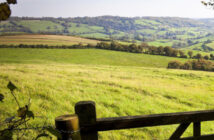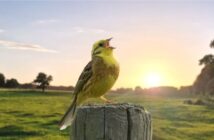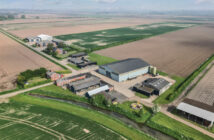Farmers and scientists involved in the SLIMERS (Strategies Leading to Improved Management and Enhanced Resilience against Slugs) project are making strides towards finding sustainable slug control methods including ‘slug resistant’ wheat varieties.
SLIMERS is a £2.6 million research project led by the British On-Farm Innovation Network (BOFIN). Launched in 2023 with six partners including Harper Adams University, John Innes Centre and UK Agri-Tech Centre.
A major part of the project is input from its 28 ‘Slug Sleuth’ farmers, recruited by BOFIN and paid to collect data from their fields. Each farmer set 100 traps to monitor population distributions across one of their fields.
This data is analysed by Harper Adams University’s Professor Keith Walters and his team for their study on the formation in fields of ‘patches’ with higher slug numbers and whether this is influenced by soil characteristics. The work aims to further understand where and why they gather. However, high rainfall and waterlogging disrupted typical slug patch formation in the first year.
Prof Walters explains: “In normal years, we have seen slugs in distinct patches in 97% of field assessments. However, under waterlogged conditions, patches were observed in only 21% of assessments.”
Subsequent laboratory experiments revealed that slugs prefer soils with moisture levels in a range around 125% moisture content. When moisture levels exceed this, slug behaviour becomes chaotic as they desperately seek drier areas to avoid drowning or dying from other causes, he explains. This means that during extreme wet conditions, reducing the amount of pesticides applied by targeting these patches (the overall objective of the work) may be less effective due to the disruption of slug patch formation and stability.
“Climate change is going to result in more extreme conditions being encountered more frequently, so understanding what’s going on is very important. I cannot imagine too many farmers would want to apply pesticides to a population of slugs which is dying already.”
Meanwhile at the UK Agri-Tech Centre’s Digital Phenotyping Laboratory, Dr Kerry McDonald-Howard is working alongside Dr Tom Ashfield of Rothamsted Research. They are making exciting headway in developing classifiers that can determine spectral difference between slugs and their field surface materials, as well as establishing whether plant damage is caused by slug feeding.
Dr Jenna Ross OBE, Project Lead and Senior International Business Development Manager at UK Agri-Tech Centre, says: “This work is leading the way to enable the team to train an autonomous slug detection system with its precision applications of biological control methods.”
Research partners at John Innes Centre have been making progress towards identifying what makes some wheat varieties more ‘slug resistant’ than others. This work is based on previous research that screened varieties from the centre’s Watkins collection of landrace wheat varieties. This singled out Watkins 788 as a potential front runner for ‘slug resistant’ properties after 78% of slugs demonstrated a dislike to it.
From there, the team at JIC, led by Dr Simon Griffiths, crossed Watkins 788 with another variety to create 85 Recombinant Inbred Lines (RILs) for further testing to help identify the gene or genes responsible for slug resistance.
The centre’s Head of Entomology and Insectory Dr Victor Soria-Carrasco runs trials on these RILS using slugs that have been posted in by ‘Slug Scouts’. These are members of the public (including farmers) that volunteer for the project to collect and post containers of grey field slugs to the centre.
Dr Simon Griffiths, Group Leader and ‘Delivering Sustainable Wheat’ Programme Lead at the John Innes Centre, says: “Early results have highlighted a number of RILs that appear to be slug resistant, as well as those that are susceptible.”
Two of these RILs as well as Watkins 788 have been multiplied up already, to be tested by seven Slug Sleuth farmers who have taken on this additional responsibility.
Tom Allen-Stevens, founder of BOFIN says: “We now need to pull apart the differences in farm scale trials and see how they perform in the field. Our farmers will be establishing blocks of Watkins 788 and the two RILS – one believed to be resistant and the other susceptible to slugs – alongside farm standard wheat.
“Over the course of the next year they will be busy taking measurements and samples to find out if these are indeed spurned by slugs and could offer potential solutions to farmers.”




